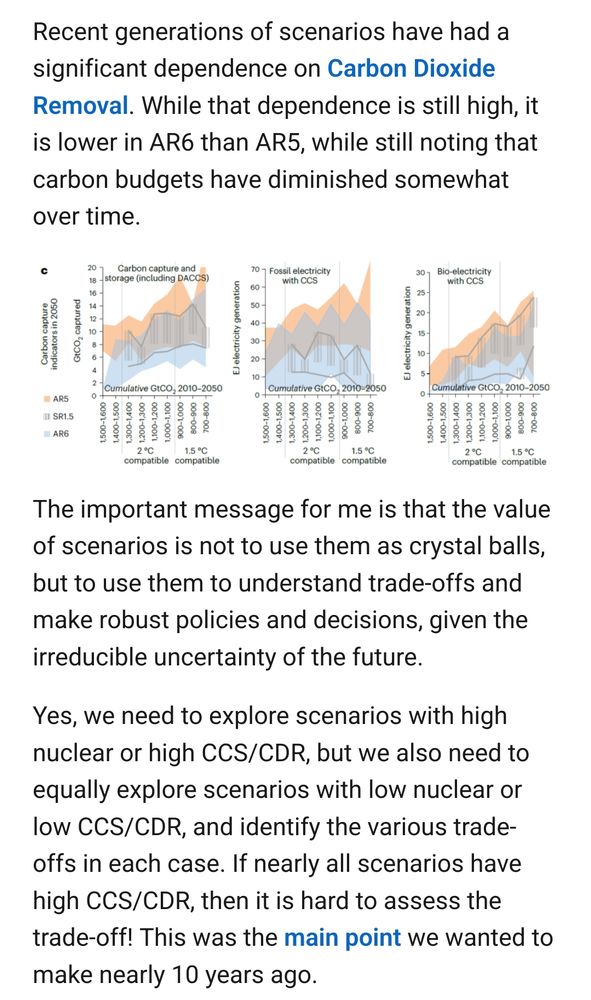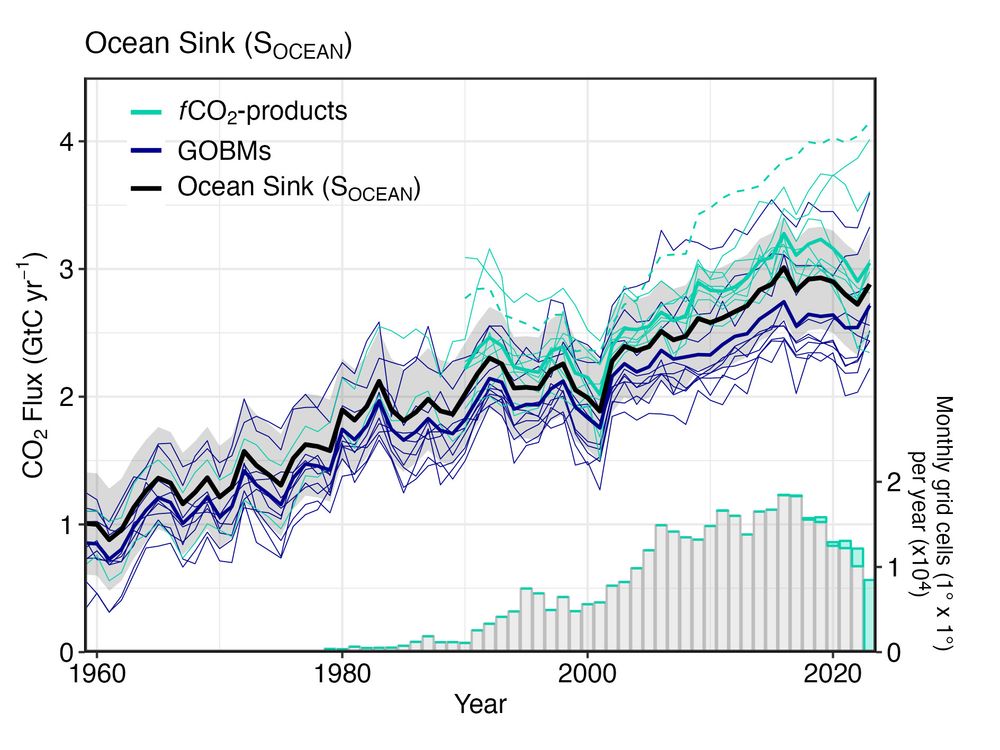
Judith Hauck
@jhauck.bsky.social
Professor of polar biogeochemical modelling at University of Bremen and ocean carbon cycle scientist / marine biogeochemical modeller at the Alfred Wegener Institute for Polar and Marine Research, Germany. Views are my own.
So nice to see #Polarstern pCO₂ data from the @awi.de MOSAiC expedition being used to provide better quantifications of Arctic Ocean CO₂ uptake. 🌊
agupubs.onlinelibrary.wiley.com/doi/10.1029/...
agupubs.onlinelibrary.wiley.com/doi/10.1029/...

September 4, 2025 at 3:00 PM
So nice to see #Polarstern pCO₂ data from the @awi.de MOSAiC expedition being used to provide better quantifications of Arctic Ocean CO₂ uptake. 🌊
agupubs.onlinelibrary.wiley.com/doi/10.1029/...
agupubs.onlinelibrary.wiley.com/doi/10.1029/...
Hier gibt's einen tollen Science Slam von @miriamseif.bsky.social über Carl das Kohlenstoffatom und biogeochemische Modellierung. Vielleicht möchtet Ihr mal reingucken, es lohnt sich!
Los geht's ab eta 41:14 - die anderen Slams sind bestimmt auch gut ;)
www.youtube.com/watch?v=EyFl...
🌊🧪@awi.de
Los geht's ab eta 41:14 - die anderen Slams sind bestimmt auch gut ;)
www.youtube.com/watch?v=EyFl...
🌊🧪@awi.de


March 4, 2025 at 2:03 PM
Hier gibt's einen tollen Science Slam von @miriamseif.bsky.social über Carl das Kohlenstoffatom und biogeochemische Modellierung. Vielleicht möchtet Ihr mal reingucken, es lohnt sich!
Los geht's ab eta 41:14 - die anderen Slams sind bestimmt auch gut ;)
www.youtube.com/watch?v=EyFl...
🌊🧪@awi.de
Los geht's ab eta 41:14 - die anderen Slams sind bestimmt auch gut ;)
www.youtube.com/watch?v=EyFl...
🌊🧪@awi.de
Wie an vielen anderen Orten Deutschlands heute auch Demo in Cuxhaven, stabil gegen rechts unter anderem mit @omasgegenrechts.bsky.social.
Morgen geht's in Bremerhaven weiter.
Morgen geht's in Bremerhaven weiter.

February 8, 2025 at 8:25 PM
Wie an vielen anderen Orten Deutschlands heute auch Demo in Cuxhaven, stabil gegen rechts unter anderem mit @omasgegenrechts.bsky.social.
Morgen geht's in Bremerhaven weiter.
Morgen geht's in Bremerhaven weiter.
Ich bin Rektorin Jutta Günther @unibremen.bsky.social sehr dankbar für ihre klare Haltung beim Neujahrsempfang:
"Die Bremischen Wissenschaftseinrichtungen haben (...) eine Erklärung veröffentlicht, deren Titel gleichermaßen unser
unverrückbares Bekenntnis ist: Demokratie. Vielfalt. Weltoffenheit.
1/
"Die Bremischen Wissenschaftseinrichtungen haben (...) eine Erklärung veröffentlicht, deren Titel gleichermaßen unser
unverrückbares Bekenntnis ist: Demokratie. Vielfalt. Weltoffenheit.
1/

January 29, 2025 at 8:07 PM
Ich bin Rektorin Jutta Günther @unibremen.bsky.social sehr dankbar für ihre klare Haltung beim Neujahrsempfang:
"Die Bremischen Wissenschaftseinrichtungen haben (...) eine Erklärung veröffentlicht, deren Titel gleichermaßen unser
unverrückbares Bekenntnis ist: Demokratie. Vielfalt. Weltoffenheit.
1/
"Die Bremischen Wissenschaftseinrichtungen haben (...) eine Erklärung veröffentlicht, deren Titel gleichermaßen unser
unverrückbares Bekenntnis ist: Demokratie. Vielfalt. Weltoffenheit.
1/
@glenpeters.bsky.social makes an important point here.
I often ready in 🌊 #mCDR papers: IPCC says we need #CDR to achieve our climate targets, as all scenarios that reach these goals include a certain level of CDR.
1/2
I often ready in 🌊 #mCDR papers: IPCC says we need #CDR to achieve our climate targets, as all scenarios that reach these goals include a certain level of CDR.
1/2

January 24, 2025 at 7:44 AM
@glenpeters.bsky.social makes an important point here.
I often ready in 🌊 #mCDR papers: IPCC says we need #CDR to achieve our climate targets, as all scenarios that reach these goals include a certain level of CDR.
1/2
I often ready in 🌊 #mCDR papers: IPCC says we need #CDR to achieve our climate targets, as all scenarios that reach these goals include a certain level of CDR.
1/2
Want to know all the details on how much climate change and terrigenous inputs affect biological carbon cycling? And how much it changes between emission scenarios?
We have you covered, also for nitrogen.
5/5
We have you covered, also for nitrogen.
5/5

January 6, 2025 at 10:23 PM
Want to know all the details on how much climate change and terrigenous inputs affect biological carbon cycling? And how much it changes between emission scenarios?
We have you covered, also for nitrogen.
5/5
We have you covered, also for nitrogen.
5/5
Surprisingly, even with an anticipated rise in primary production across a wide range of emission scenarios, our findings indicate that climate change will lead to a counterintuitive 40% reduction in the efficiency of the 🌊 Arctic Ocean’s biological carbon pump by 2100.
3/5
3/5

January 6, 2025 at 10:23 PM
Surprisingly, even with an anticipated rise in primary production across a wide range of emission scenarios, our findings indicate that climate change will lead to a counterintuitive 40% reduction in the efficiency of the 🌊 Arctic Ocean’s biological carbon pump by 2100.
3/5
3/5
Der Wald ist ja nicht im Gleichgewicht: der atmosphärische CO2-Gehalt steigt, das hat eine Düngefunktion. Daher können die Wälder einen Teil unserer CO2 Emissionen zusätzlich aufnehmen (= ist eine Senke).
Klimawandel hat den entgegengesetzten Effekt.
Klimawandel hat den entgegengesetzten Effekt.

November 23, 2024 at 4:18 PM
Der Wald ist ja nicht im Gleichgewicht: der atmosphärische CO2-Gehalt steigt, das hat eine Düngefunktion. Daher können die Wälder einen Teil unserer CO2 Emissionen zusätzlich aufnehmen (= ist eine Senke).
Klimawandel hat den entgegengesetzten Effekt.
Klimawandel hat den entgegengesetzten Effekt.
With 4°C and rain, yesterday was time to get the barmuffs into place. They are a real gamechanger for cycling in northern Germany in autumn and winter 🌧️💨
#biking
#biking

November 19, 2024 at 7:03 AM
With 4°C and rain, yesterday was time to get the barmuffs into place. They are a real gamechanger for cycling in northern Germany in autumn and winter 🌧️💨
#biking
#biking
Another troubling trend is the decline in ocean carbon observations, which are now at the same level as in the early 2000s - this is illustrated by the barplot in the lower right.
8/10
8/10

November 13, 2024 at 9:59 PM
Another troubling trend is the decline in ocean carbon observations, which are now at the same level as in the early 2000s - this is illustrated by the barplot in the lower right.
8/10
8/10
Of course, the difference in the decadal mean estimate of the ocean carbon sink is still too large for comfort, and this is further emphasized when including an oxygen-based estimate.
7/10
7/10

November 13, 2024 at 9:59 PM
Of course, the difference in the decadal mean estimate of the ocean carbon sink is still too large for comfort, and this is further emphasized when including an oxygen-based estimate.
7/10
7/10
Clearly, the CO₂ effect dominates over the climate effect in the ocean. Yet, climate change and variability reduces the ocean carbon sink, by about 6% over the past decade.
Often people think this is a warming effect, but changing wind patterns actually matter more ...
3/10
Often people think this is a warming effect, but changing wind patterns actually matter more ...
3/10

November 13, 2024 at 9:59 PM
Clearly, the CO₂ effect dominates over the climate effect in the ocean. Yet, climate change and variability reduces the ocean carbon sink, by about 6% over the past decade.
Often people think this is a warming effect, but changing wind patterns actually matter more ...
3/10
Often people think this is a warming effect, but changing wind patterns actually matter more ...
3/10
In view of increasing atmospheric CO₂ and absence of La Niña, what else could the ocean sink do as to increase in 2024?
That's what is projected here.
2/10
That's what is projected here.
2/10

November 13, 2024 at 9:59 PM
In view of increasing atmospheric CO₂ and absence of La Niña, what else could the ocean sink do as to increase in 2024?
That's what is projected here.
2/10
That's what is projected here.
2/10
The ocean takes up anthropogenic CO₂ emissions, 26% on average over the past decade.
The #GlobalCarbonBudget 2024 confirms that the ocean sink increased in 2023 after 3 years of stagnation due to rare triple La Niña event. 2023 was an El Niño year, with an expected increase in the sink.
🔽
🌊 1/10
The #GlobalCarbonBudget 2024 confirms that the ocean sink increased in 2023 after 3 years of stagnation due to rare triple La Niña event. 2023 was an El Niño year, with an expected increase in the sink.
🔽
🌊 1/10

November 13, 2024 at 9:59 PM
The ocean takes up anthropogenic CO₂ emissions, 26% on average over the past decade.
The #GlobalCarbonBudget 2024 confirms that the ocean sink increased in 2023 after 3 years of stagnation due to rare triple La Niña event. 2023 was an El Niño year, with an expected increase in the sink.
🔽
🌊 1/10
The #GlobalCarbonBudget 2024 confirms that the ocean sink increased in 2023 after 3 years of stagnation due to rare triple La Niña event. 2023 was an El Niño year, with an expected increase in the sink.
🔽
🌊 1/10
btw @climateofgavin.bsky.social following up from a discussion when X was still called twitter
In the #RECCAP Southern Ocean chapter we looked at how the ocean bgc models reproduce recent temperature trends and thermal effects on air-sea CO2 fluxes and the forced ocean models do fine...
In the #RECCAP Southern Ocean chapter we looked at how the ocean bgc models reproduce recent temperature trends and thermal effects on air-sea CO2 fluxes and the forced ocean models do fine...

November 7, 2024 at 4:17 PM
btw @climateofgavin.bsky.social following up from a discussion when X was still called twitter
In the #RECCAP Southern Ocean chapter we looked at how the ocean bgc models reproduce recent temperature trends and thermal effects on air-sea CO2 fluxes and the forced ocean models do fine...
In the #RECCAP Southern Ocean chapter we looked at how the ocean bgc models reproduce recent temperature trends and thermal effects on air-sea CO2 fluxes and the forced ocean models do fine...
I deactivated my X account and it feels so good.

November 7, 2024 at 4:07 PM
I deactivated my X account and it feels so good.
One of the #RECCAP chapters where I learned most 🔽
e.g.
"The seasonal amplitude of the CO2 flux is 50%–100% larger in the models at mid-latitudes (despite having a similar phasing, i.e., stronger sink in winter and spring)."
Knowing about the specific biases is necessary to improve them.
e.g.
"The seasonal amplitude of the CO2 flux is 50%–100% larger in the models at mid-latitudes (despite having a similar phasing, i.e., stronger sink in winter and spring)."
Knowing about the specific biases is necessary to improve them.

November 7, 2024 at 4:04 PM
One of the #RECCAP chapters where I learned most 🔽
e.g.
"The seasonal amplitude of the CO2 flux is 50%–100% larger in the models at mid-latitudes (despite having a similar phasing, i.e., stronger sink in winter and spring)."
Knowing about the specific biases is necessary to improve them.
e.g.
"The seasonal amplitude of the CO2 flux is 50%–100% larger in the models at mid-latitudes (despite having a similar phasing, i.e., stronger sink in winter and spring)."
Knowing about the specific biases is necessary to improve them.
Maybe as a first step to understand the regional dynamics better and develop an idea on optimal deployment scenarios:
Carbon uptake and accumulation is largest in summer when mixed layers are shallow, thus allowing for more CO₂ uptake before alkalinity is lost to depth.
#seasonality #OAE 🌊
8/x
Carbon uptake and accumulation is largest in summer when mixed layers are shallow, thus allowing for more CO₂ uptake before alkalinity is lost to depth.
#seasonality #OAE 🌊
8/x

October 8, 2024 at 3:24 PM
Maybe as a first step to understand the regional dynamics better and develop an idea on optimal deployment scenarios:
Carbon uptake and accumulation is largest in summer when mixed layers are shallow, thus allowing for more CO₂ uptake before alkalinity is lost to depth.
#seasonality #OAE 🌊
8/x
Carbon uptake and accumulation is largest in summer when mixed layers are shallow, thus allowing for more CO₂ uptake before alkalinity is lost to depth.
#seasonality #OAE 🌊
8/x
My fav figure:
This shows that - relatively speaking- more carbon reaches the deep ocean when #OAE is applied in deep water formation regions.
I wonder: isn't this something useful? The signal is distributed over a larger volume and any associated risks are distributed and thus diluted more.
7/x 🌊
This shows that - relatively speaking- more carbon reaches the deep ocean when #OAE is applied in deep water formation regions.
I wonder: isn't this something useful? The signal is distributed over a larger volume and any associated risks are distributed and thus diluted more.
7/x 🌊

October 8, 2024 at 3:17 PM
My fav figure:
This shows that - relatively speaking- more carbon reaches the deep ocean when #OAE is applied in deep water formation regions.
I wonder: isn't this something useful? The signal is distributed over a larger volume and any associated risks are distributed and thus diluted more.
7/x 🌊
This shows that - relatively speaking- more carbon reaches the deep ocean when #OAE is applied in deep water formation regions.
I wonder: isn't this something useful? The signal is distributed over a larger volume and any associated risks are distributed and thus diluted more.
7/x 🌊
Side note: When accounting for nutrient addition (assuming we use olivine as source of alkalinity), ocean CO₂ uptake is much larger (we knew this before), see dashed lines and hatched bars. Essentially, this is iron fertilization in the Southern Ocean.
6/x
6/x

October 8, 2024 at 3:12 PM
Side note: When accounting for nutrient addition (assuming we use olivine as source of alkalinity), ocean CO₂ uptake is much larger (we knew this before), see dashed lines and hatched bars. Essentially, this is iron fertilization in the Southern Ocean.
6/x
6/x
Over the 70 years of the simulation (2030 to 2100), the efficiency of OAE are pretty much indistinguishable between deep/bottom water formation regions and global applications (with the exception of the Norwegian/Barents Sea region). This is in contrast to some previous work...
3/x 🌊
3/x 🌊

October 8, 2024 at 3:04 PM
Over the 70 years of the simulation (2030 to 2100), the efficiency of OAE are pretty much indistinguishable between deep/bottom water formation regions and global applications (with the exception of the Norwegian/Barents Sea region). This is in contrast to some previous work...
3/x 🌊
3/x 🌊
We first identified where deep and bottom water formation occurs in the model (FESOM2.1-REcoM3), and add alkalinity in these regions. Some simulations mimic olivine addition and thus also have nutrient addition (silicic acid and iron).
2/x
2/x

October 8, 2024 at 2:17 PM
We first identified where deep and bottom water formation occurs in the model (FESOM2.1-REcoM3), and add alkalinity in these regions. Some simulations mimic olivine addition and thus also have nutrient addition (silicic acid and iron).
2/x
2/x
I don't manage to keep here with all the presentations. Highlights from the last days:
Julia Pongratz: A consistent budgeting of terrestrial carbon fluxes.
Eric Morgan on atmospheric potential oxygen.
Stephen Sitch giving a nice introduction to Trendy also for oceanographers :)
Julia Pongratz: A consistent budgeting of terrestrial carbon fluxes.
Eric Morgan on atmospheric potential oxygen.
Stephen Sitch giving a nice introduction to Trendy also for oceanographers :)


July 31, 2024 at 4:18 PM
I don't manage to keep here with all the presentations. Highlights from the last days:
Julia Pongratz: A consistent budgeting of terrestrial carbon fluxes.
Eric Morgan on atmospheric potential oxygen.
Stephen Sitch giving a nice introduction to Trendy also for oceanographers :)
Julia Pongratz: A consistent budgeting of terrestrial carbon fluxes.
Eric Morgan on atmospheric potential oxygen.
Stephen Sitch giving a nice introduction to Trendy also for oceanographers :)



